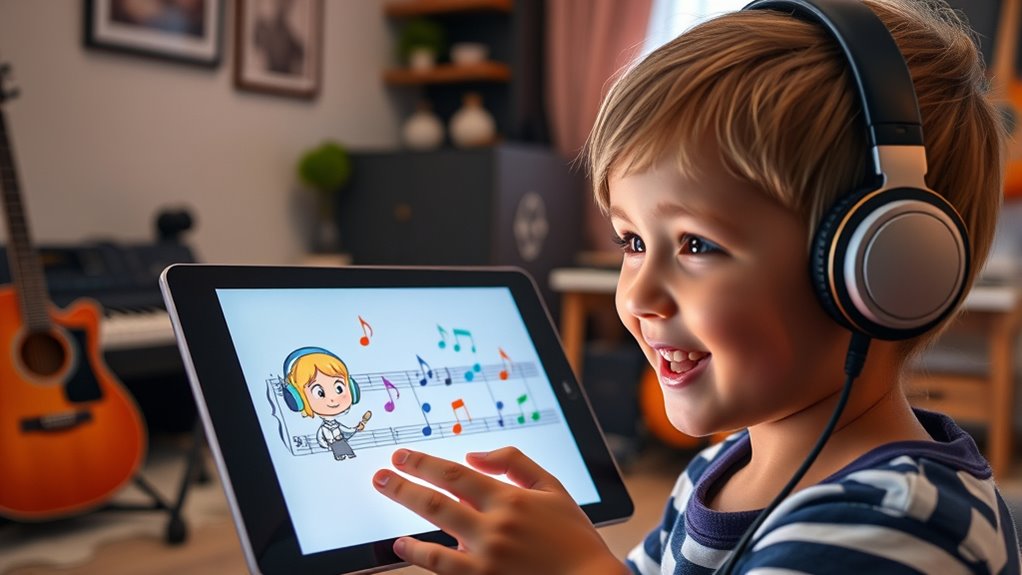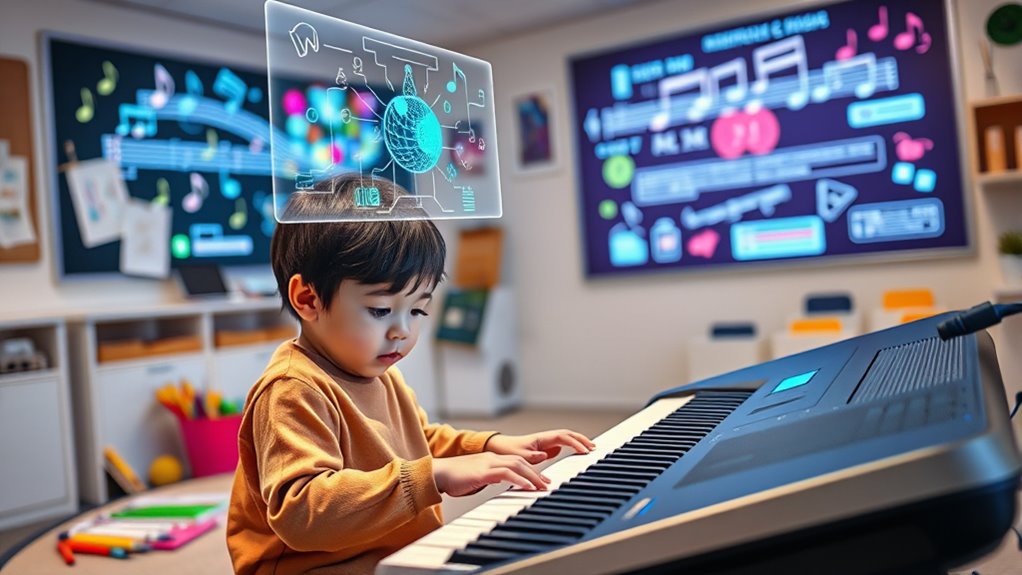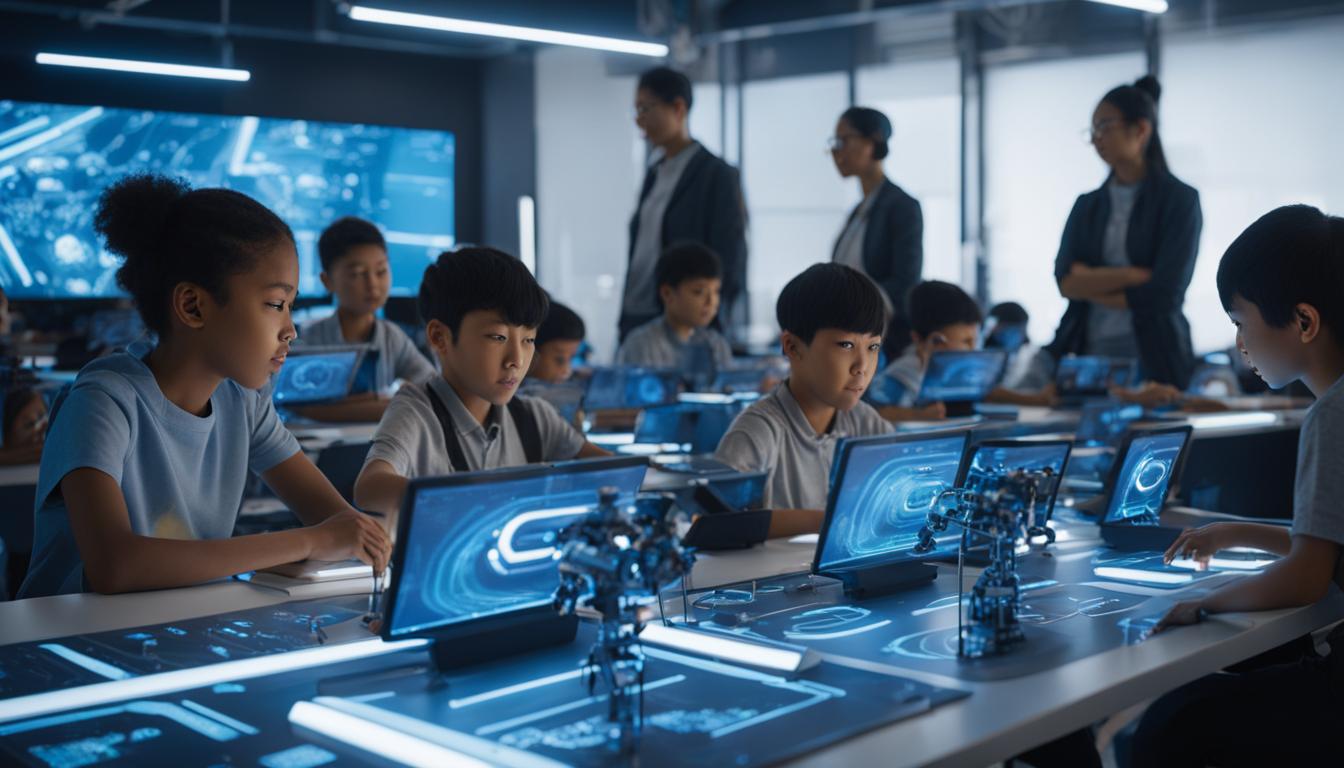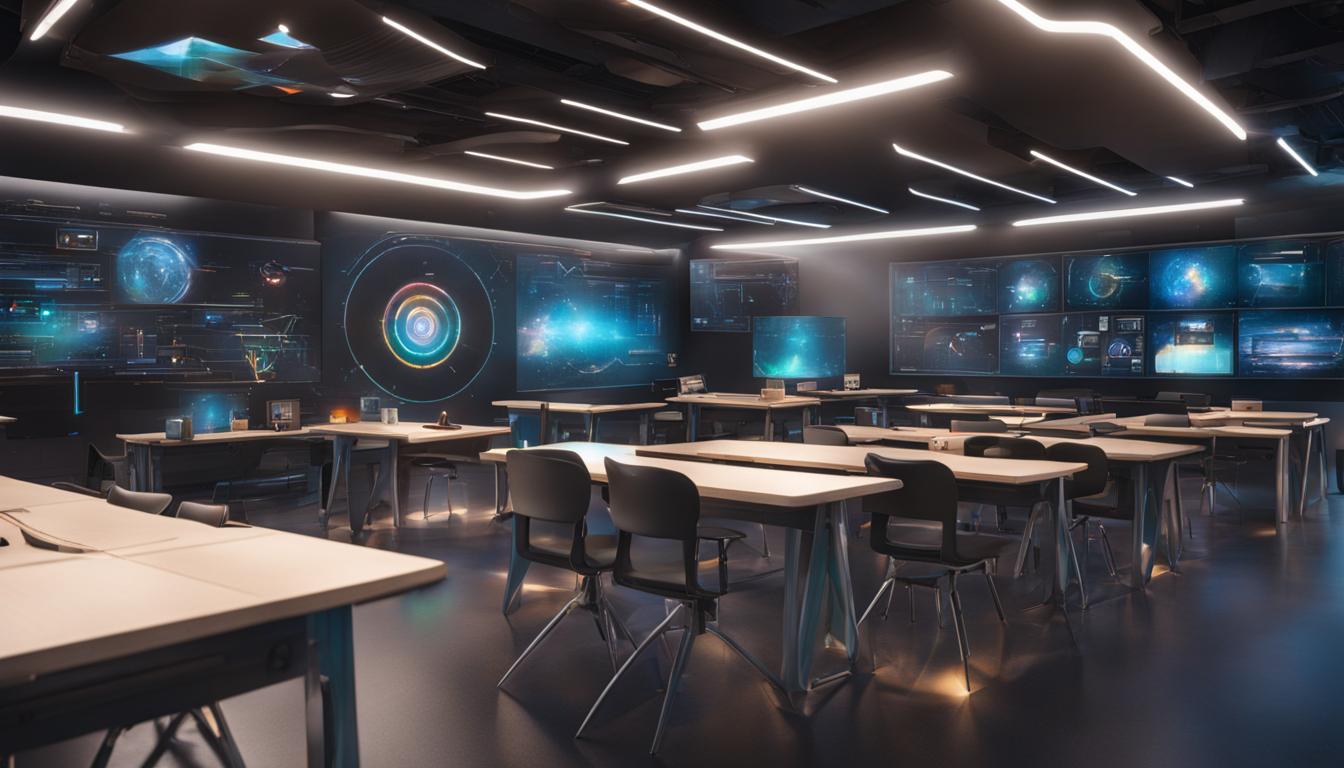AI in virtual music lessons for kids makes learning more accessible, personalized, and engaging. It offers tailored lessons based on your child’s skill level, providing instant feedback and fun, gamified activities that boost motivation. These platforms remove geographical barriers, making quality music education available at home. While challenges exist, ongoing advancements aim to improve content quality and integration. Keep exploring to discover how this innovative technology can transform your child’s musical journey.
Key Takeaways
- AI personalizes lessons by adapting to each child’s skill level and learning pace in virtual music education.
- Interactive, gamified AI tools increase engagement and motivation for young learners.
- Real-time feedback from AI helps children correct mistakes and improve skills quickly.
- AI expands access to quality music lessons globally, overcoming geographical and resource barriers.
- Challenges include ensuring content quality, maintaining human interaction, and addressing ethical considerations.

Artificial Intelligence is transforming virtual music lessons for kids by making learning more engaging, personalized, and accessible. The online music education market is booming, expected to reach over $10 billion by 2032, with a steady growth rate of 14.2% annually from 2025 to 2032. This rapid expansion reflects how AI is becoming a key component in enhancing learning experiences, allowing children worldwide to access quality music education from the comfort of their homes. With AI-powered platforms, you can now enjoy lessons tailored specifically to your child’s skill level and learning pace, ensuring they don’t get bored or overwhelmed. These platforms analyze performance data to create customized lesson plans, making sure every child progresses comfortably and confidently.
AI technologies such as generative AI are reshaping formal music education by introducing innovative tools. These tools generate personalized content, like practice exercises, songs, or tutorials, that adapt in real-time to your child’s evolving skills. This means lessons aren’t static but dynamically adjust, keeping your child challenged yet motivated. Interactive exercises and gamified activities further boost engagement, transforming learning into a fun experience. Your child can interact with AI-driven apps that offer instant feedback on their performance, helping them correct mistakes immediately and develop better technique faster. This immediate reinforcement accelerates progress and builds confidence. Additionally, advances in AI-driven personalization are making these tools more effective at catering to individual learning styles and needs. Moreover, the integration of adaptive learning techniques allows these platforms to refine their approaches based on ongoing performance data, creating a more efficient learning process. As these systems continuously evolve, they can better identify and support each child’s unique strengths and challenges.
Generative AI personalizes music lessons, adapts in real-time, and provides instant feedback to boost learning and confidence.
The benefits extend beyond engagement and personalization. AI-based lessons are highly flexible—your child can learn at any time that suits your schedule, removing the constraints of traditional class timings. These tools are also cost-effective, reducing the expenses associated with private tutors or physical classes. Furthermore, AI platforms are accessible globally, bridging geographical gaps and providing children in remote areas with the same high-quality education as those in urban centers. They are also inclusive, accommodating learners with different abilities and learning styles, promoting a more equitable learning environment. Moreover, understanding the role of natural elements like wave and wind helps illustrate how environmental factors influence beach ecosystems, which can be a metaphor for the adaptive nature of AI in education. Moreover, advancements in AI are making these tools more user-friendly, ensuring that even beginners can navigate and benefit from the technology with ease. As AI continues to evolve, its integration into education is expected to become more seamless and intuitive, further enhancing the learning experience.
While the advantages are significant, implementing AI in music education isn’t without challenges. Reliable internet access and suitable hardware are essential, which might be a barrier for some families. Ensuring the quality and relevance of AI-generated content is essential for effective learning, and over-reliance on technology could diminish human interaction, which plays an important role in musical development. Ethical concerns, like copyright issues, also arise when AI creates or reproduces music content. Teachers need proper training to integrate these tools effectively, ensuring they complement rather than replace human guidance. Additionally, ongoing research into educational technology emphasizes the importance of balancing technological tools with traditional teaching methods to optimize learning outcomes.
Frequently Asked Questions
How Does AI Personalize Learning for Each Child’s Skill Level?
You might wonder how AI personalizes learning for each child’s skill level. AI analyzes your child’s progress in real-time, identifying strengths and areas needing improvement. It then provides immediate, tailored feedback and adjusts lessons accordingly. By evaluating skill levels and monitoring ongoing performance, AI creates customized learning paths, incorporating diverse content and interactive tools. This guarantees each child learns at their own pace, making the experience engaging, effective, and perfectly suited to their individual needs.
Can AI Detect and Correct a Child’s Musical Mistakes Accurately?
Think of AI as a vigilant musical coach, always listening and ready to spot errors. It can accurately detect mistakes like pitch, rhythm, and tempo deviations, especially when trained on diverse datasets. While it’s quite precise, it might sometimes miss subtle overlaps or struggle with noisy environments. Still, AI’s ability to provide instant feedback helps kids correct mistakes quickly, making practice more effective and engaging.
What Safety Measures Protect Children’s Privacy During Ai-Based Lessons?
You need to know that safety measures protect children’s privacy by ensuring data is encrypted and access is restricted to authorized personnel. Parental controls and clear privacy notices help you manage what data is collected and how it’s used. Regularly reviewing privacy settings and encouraging children to report concerns keeps their information secure. These safeguards, along with compliance to laws like COPPA, help create a safe, trustworthy learning environment for your child.
How Engaging Are Ai-Driven Virtual Music Lessons for Young Kids?
You find AI-driven lessons engaging because they make learning fun, interactive, and personalized. They adapt to your child’s pace, keeping their attention sharp. With real-time feedback, they boost confidence and motivation. Virtual environments simulate real performances, inspiring creativity. Gamified exercises and diverse styles keep kids excited, encouraging exploration. Overall, these lessons transform practice into an enjoyable experience, helping your child learn music passionately and stay engaged throughout their musical journey.
Are There Limitations to Ai’s Ability to Teach Different Musical Instruments?
You’ll find that AI has limitations when teaching different musical instruments. It struggles with nuanced sounds, precise finger placement, and techniques like embouchure or bowing. AI can’t fully assess physical aspects such as posture or breathing. While helpful as a supplement, it isn’t a complete substitute for human instruction, especially for complex instruments or techniques requiring real-time, personalized feedback. Combining AI with human teaching offers the best learning experience.
Conclusion
AI is transforming virtual music lessons for kids, making learning more personalized and engaging than ever before. With real-time feedback and adaptive instruction, you can see your child’s musical skills grow confidently from home. Isn’t it exciting to think how technology can inspire the next generation of musicians? Embracing AI in music education could unseal your child’s full potential, turning practice into an adventure they’ll love. Are you ready to embrace this musical revolution?











